“This is where our countrymen are, our kababayan.”
Whether it’s hungry congregants from St. Mary’s Parish looking for a bite, or the steady stream of workers leaving the nearby SkyTrain station, Bennet Miemban-Ganata and her crew at the Plato Filipino restaurant on Joyce Street are ready to feed them.
The food is served “turo-turo” style, meaning “point point”; easy to select the dishes you want from the long steam table. From behind the trays of chicken adobo and beef caldereta, Miemban-Ganata warmly greets her elders who come in with “Tita!” and “Tito!”
A former cultural officer at Vancouver’s Philippine consulate, she’s always looked out for the diaspora. In recent years, she’s cared for them in a different way, providing dishes from home.
“My heart’s always been close to the community,” said Miemban-Ganata, who knows that the area around the Joyce-Collingwood SkyTrain and bus loop has long been a landing place for Filipino newcomers to the city before they move elsewhere in the region.
“That’s what motivates me: to be of service. I want my fellow Filipinos to do more, get involved in the community and reach their goals — not just settle for what is given to them.”
But recently, a giant blue rezoning notice, promising new condos, has been erected on the lawn in front of her restaurant and its five neighbouring businesses.
It’s an all-too-familiar Vancouver sign that their days are numbered.
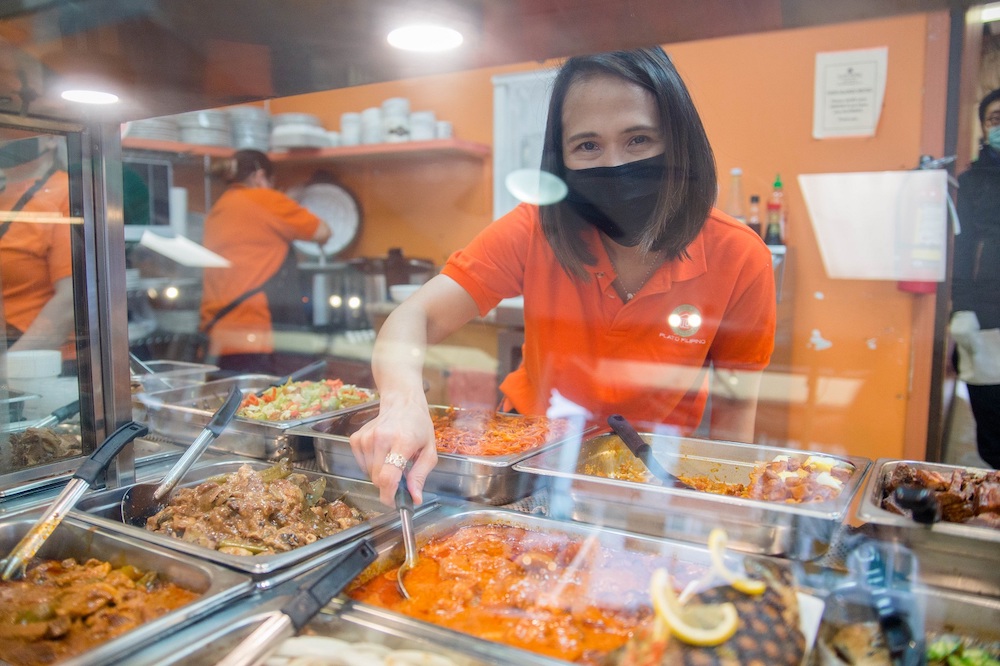
The developer Nest Group is planning a new tower for the property, proposing 32 storeys that include 293 condo units, six floors of parking and a new public library on the second floor. Two large commercial spaces would replace the six there now.
There is a virtual open house for the project until March 28 for the public to submit comments. If the rezoning is approved, the next stage is a development application, which, for a project of this size in Vancouver, would take around two years.
That means these Filipino businesses won’t be gone anytime soon. However, it is not likely that mom-and-pops like them will be moving into the proposed tower, as new developments tend to prefer offices, banks and chain and franchise retailers instead. (A relatively new condo building on nearby Kingsway, for example, had the entirety of its 6,000 square feet of commercial space leased to a Bank of Montreal.)
The small cluster of businesses on Joyce Street around the SkyTrain station might not be the official consulate that Miemban-Ganata once worked for, but it might as well be an unofficial one.
There’s been a Filipino community here for at least three decades. Along with restaurants like Plato Filipino, serving everyday meals and filling large orders for baptisms and birthdays, there are remittance services, fresh produce for sale and specific goods like pandesal and longanisa.
Before the internet took off, this was the place to find Filipino video tapes, community newspapers and cheap phone cards for calls home. St. Mary’s, holding masses in English and Tagalog, has a migrant ministry to help newcomers with finances and family reunification.
This pocket of the east side — with star-shaped parols still in the windows, a Filipino Christmastime tradition — is the closest thing the region has to a Filipino Town or Little Manila of the U.S. or Saudi Arabia, though it might as well be called Micro Manila for its small size.
The city describes the Joyce business area in its precinct plan like this: “limited,” with an “irregular land-use mix” and “weak commercial street frontage.”
“For whom is it weak?” wondered geographer John Paul Catungal of UBC’s Social Justice Institute.
It’s a rare thing for a community like this to even be established, he says. Filipinos may be the region’s third largest immigrant group, numbering 100,000, but the largely working-class population doesn’t often have the financial means to open a business.
And so the Joyce area, with its church, services, transit hub and somewhat affordable housing mix has become special place for immigrants who keep the city going.
That’s why advocates say it would be gutting if the Nest tower displaces the six businesses that provide crucial services to the local community.
The owners of the impeccably clean Sari Sari store, which shares a building with Plato and is also caught up in the rezoning, know this. Charles and Malou Tsang bought the business 15 years ago to continue its legacy of serving the community, now in its 25th year.
Sari sari stores, literally translating to “variety store,” are everywhere in the Philippines. Any newcomer in Vancouver knows to Google “sari sari” if they want Filipino goods, explains the fastidious Malou, who keeps organized the shelves of banana sauce and freezers of milkfish.
Romnick Salon and Abby Ropero, who strolled in one recent afternoon after lunch at Plato, are proof of the Sari Sari store’s magnetism. They stopped by before their drive back home to Nelson and bought $70 of goods, from Filipino snacks to papaya soap.
“You can’t get this in Nelson!” they said before dashing out.
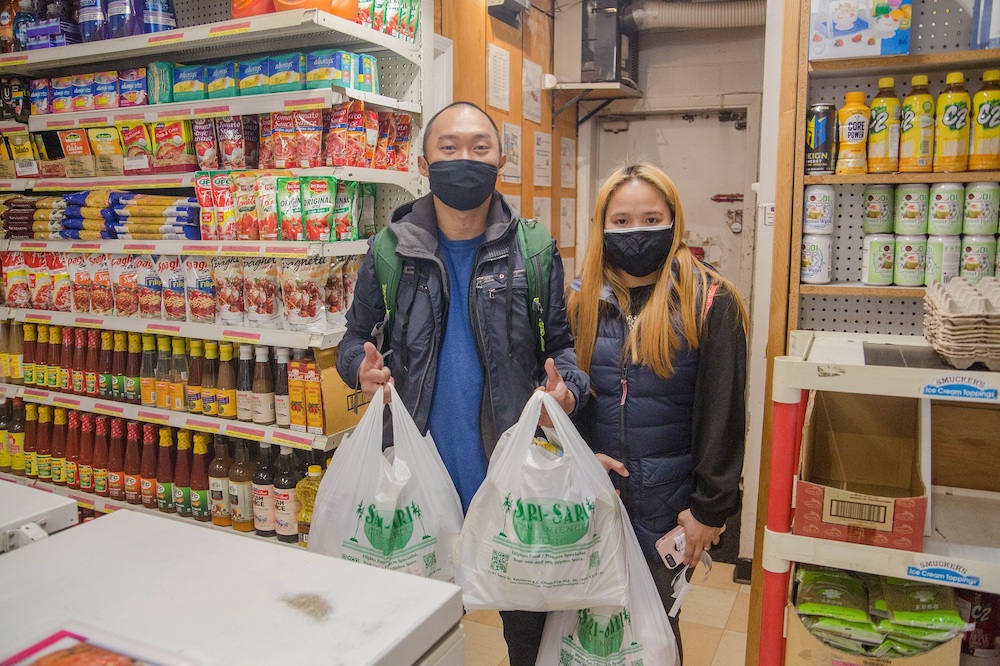
The remittance service that Sari Sari operates is critical for a diaspora that often works multiple jobs to wire money to families back home. Even with layoffs and budgets tight during the pandemic, “they still want to send what they have,” said Charles.
Also in the building is Pampanga’s Cuisine, run by Edith Malang and her two sons Jio and J, serving food from her home province. They boast “the best crispy sisig,” a well-known Pampangan dish of pig head parts and chicken liver, usually seasoned with calamansi, onions and chili peppers.
Like her neighbours, Malang is also community minded, thinking about the time, work and money she can save her customers.
“If you set the price too high, even if it’s good quality, it’s no longer affordable for their budgets,” she said.
Pampanga’s long steam table holds trays of hot dishes like kare-kare (pork, oxtail and veggies in a peanut sauce) and dinuguan (a hearty stew of pork blood and vinegar). A bestseller is the $10 combo, two dishes with rice and soup, which some customers parse out to eat as multiple meals.
Even without the catering and the church crowds they served pre-pandemic, business is good.
“The friendly competition keeps us on our toes,” said Mary Loa, Malang’s neighbour who runs the restaurant and bakery Kumare Express. “It’s good for people to have choices. We’re more alert with better cleanliness, better service.”
Loa, who used to own a Blenz franchise, opened two Kumare restaurants in Richmond and Delta but says Joyce is the most fast paced, with workers from the suburbs picking up food before venturing downtown, to the North Shore or the west side.
“You know, Filipinos have their baon,” explains Malang at Pampanga’s, a word for a packed meal. “The frontliners, especially nurses, they don’t have time to cook. They say, ‘I want 10 combos!’ That’s why when I order my containers, I want them to be microwave safe. So that when they get to work, even the containers for rice, they can just reheat it. They have their breakfast, they have their lunch, they have their dinner.”
Malang has an eye for customer needs, whether it’s the caregivers and cleaners hopping off the buses and trains to grab takeout, or the seniors who live in next-door’s Columbus Tower. She makes sure they get to the front of the lineups that snake out the door and gives them whatever extras they want.
If there is a homeless customer or someone who realizes they’re short on cash, Malang is happy to let them have the food.
“Imagine there’s a lineup,” she said. “They’ll be totally embarrassed if they can’t pay their bill. I don’t know, maybe their son or daughter are at home. It’s not a big loss for me, but for them it’s a big help. I always say, I’m not going to be a millionaire off one combo, or five combos!”
Whatever’s left at the end of the day goes to her staff — proof, says Malang, that the guests eat just as well as they do.
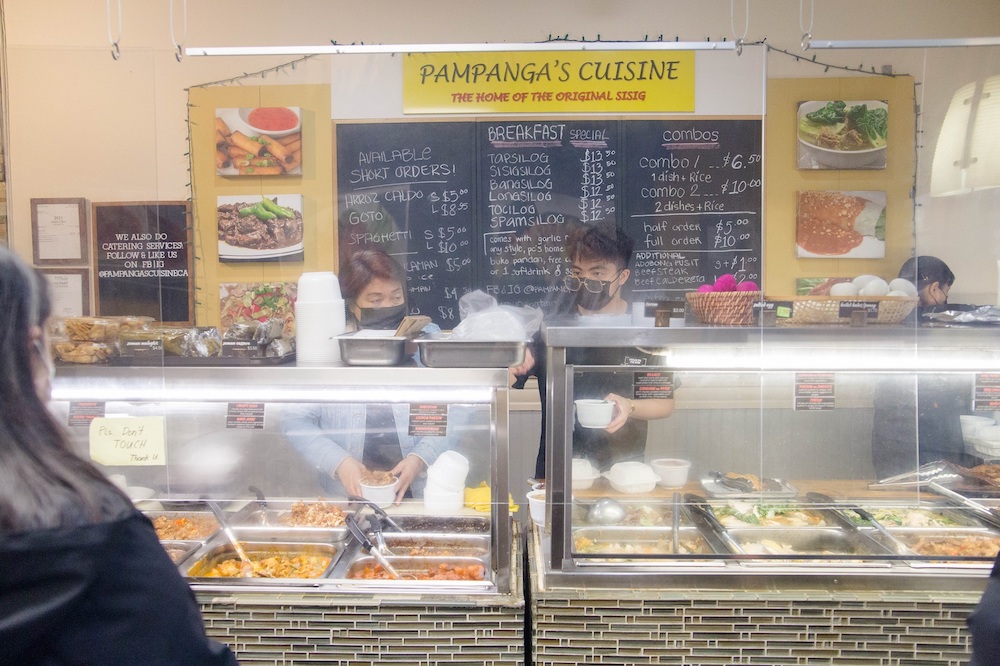
When the rezoning sign went up, Malang says her customers were more worried than she was.
“My heart beats knowing that they acknowledge my business here,” she said. “But who I am to contradict the plan? It’s for advancement. When you build something new, it means the community is progressing.”
Malang is planning to open a second location on Fraser near King Edward. There is a small cluster of Filipino businesses there, even as the neighbourhood is gentrifying.
But for Malang’s transiting customers who don’t have cars to visit her there for a $10 meal, “I worry they won’t have the access,” she said.
The Tyee emailed the architect and developer Nest Group on Tuesday and followed up with calls on Wednesday. A developer representative said she would try to get more information on what kind of commercial businesses they envision for the proposed tower, but has yet to provide it.
Of the four businesses interviewed, only the Tsangs of the Sari Sari store have plans to stay in the area, though about eight minutes away, and they are opening a café instead.
The Joyce area is no stranger to density. According to census tract data, the area near the SkyTrain station is the densest in Vancouver, with about 3.8 people per 1,000 square feet. To compare, the second densest tract, located downtown, is about 3.2 people per the same area.
Joyce is also no stranger to developer partnerships. The treasured Collingwood Neighbourhood House, school and daycare were built by Concert Properties in collaboration with the city. The library on the second floor of the proposed Nest tower continues this growth strategy.
But UBC geographer Catungal raises a question about how new real estate projects might harm the neighbourhood as it exists today, especially if they eliminate the small businesses that people depend on.
The region’s strategy of growth near transit has goals like sustainability that sound nice on paper, but they have side effects.
“There’s displacement, but who’s doing the replacing?” asks Catungal, referring to the Nest tower’s potential condo dwellers and commercial tenants. “The neighbourhood will then be shaped in their image, in terms of what they need and what they want.”
Vancouver’s gentrifying Fraserhood, for example, once home to Polish, Vietnamese and Filipino newcomers, has fancy new bars and eateries opening where immigrant delis and markets once thrived.
“Our sense of belonging in the city is not just shaped by what’s around where we live,” said Catungal, highlighting that the Joyce area is important to residents and visitors alike, a crucial pit stop.
“Our identity is the way we conduct our everyday lives, the way we maintain connections with cultural practices, including food. It’s really important for the community to come together and let the city know; I think they take for granted these spaces as just ‘businesses.’”
The area around the SkyTrain is currently a mix of every kind of dwelling — condo and rental towers, co-op mid-rises, social housing and single-family homes.
The city says it’s aware the businesses could be displaced and is looking at “supports” and “options” to reduce the impacts of redevelopment. It’s also working on translating an outreach postcard into Tagalog.
RJ Aquino, a director at the Collingwood Neighbourhood House, doesn’t see the Filipino community leaving the area, “just dissipating a bit.”
“People’s routines have calcified around Joyce,” he said. Like Catungal, Aquino hopes that the community will speak up about what this node of a neighbourhood means to them.
Aquino, who co-founded the Tulayan Filipino Diaspora Society, says it’s not easy getting working-class immigrants involved in civic engagement.
“They’re working one or two jobs to survive. I would say it’s not out of disinterest, more of not fully appreciating the gravity of the situation.”
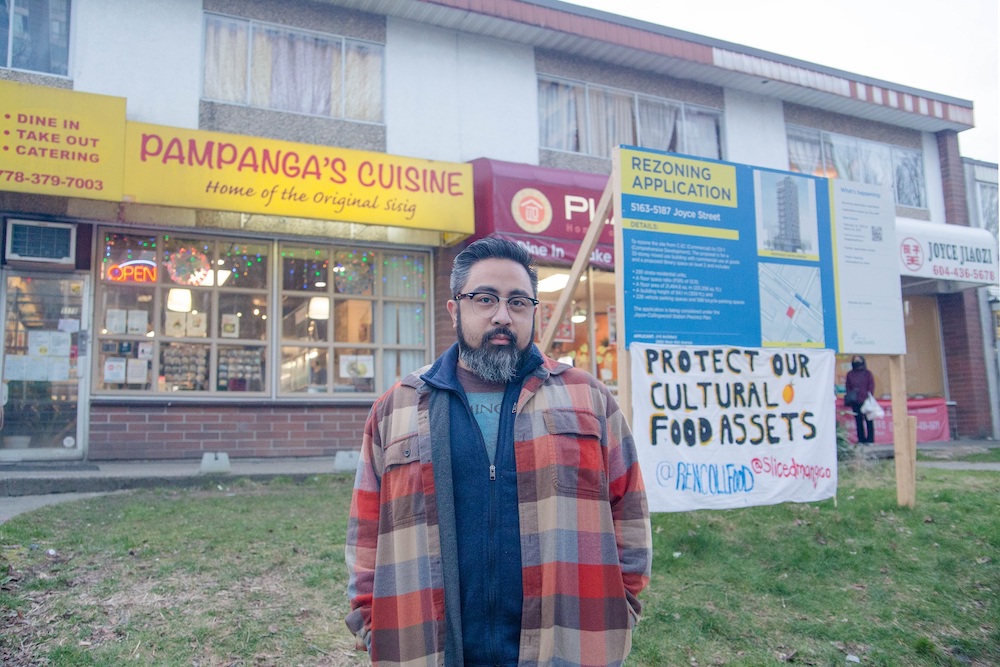
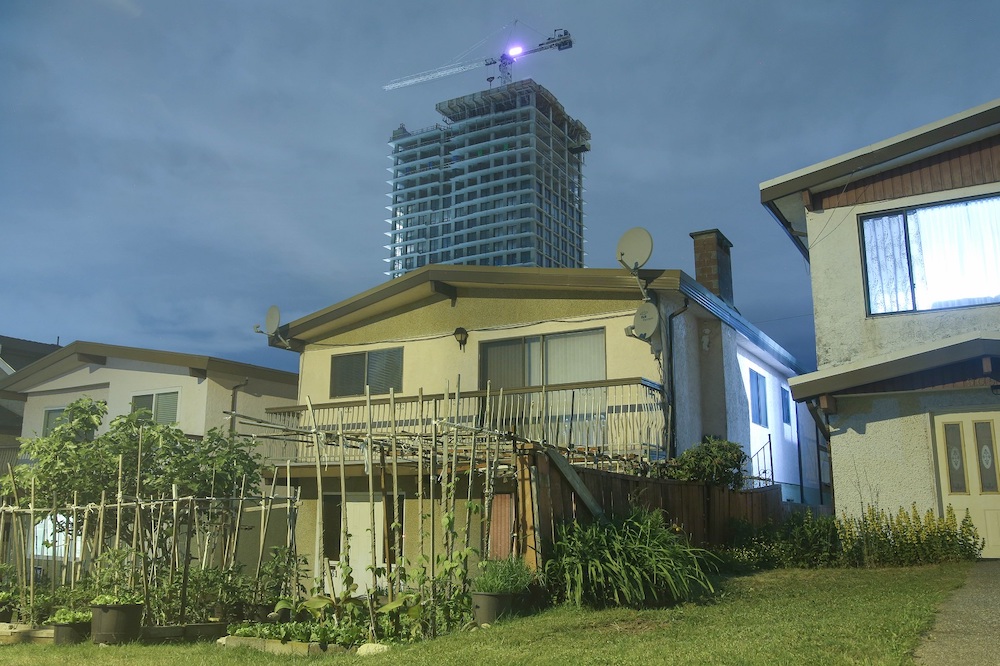
According to the census, 56 per cent of the neighbourhood is immigrants, and 53 per cent don’t speak English at home. The average household here makes $77,000, less than the average of the city as a whole of $94,000.
Organizations like Collingwood Food Justice and Sliced Mango Collective have set up in front of the Filipino businesses to collect feedback from passersby on how they feel about the prospect of losing them and change in the neighbourhood.
In general, the business owners, who know their wood-frame building is old, are accepting of the change. They just want a place in it.
“We can still build out the neighbourhood and grow the neighbourhood,” said Aquino, “but not at the cost of what makes it great.”
The public can comment on the 5163-5187 Joyce St. rezoning at the City of Vancouver’s website here. ![]()
Read more: Food, Housing, Urban Planning




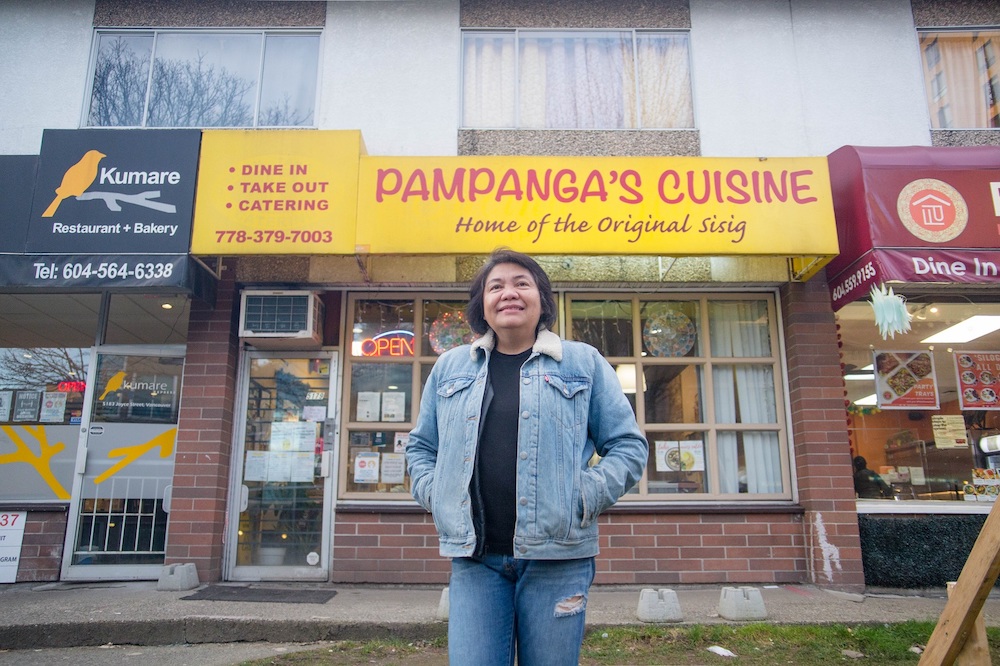












Tyee Commenting Guidelines
Comments that violate guidelines risk being deleted, and violations may result in a temporary or permanent user ban. Maintain the spirit of good conversation to stay in the discussion and be patient with moderators. Comments are reviewed regularly but not in real time.
Do:
Do not: